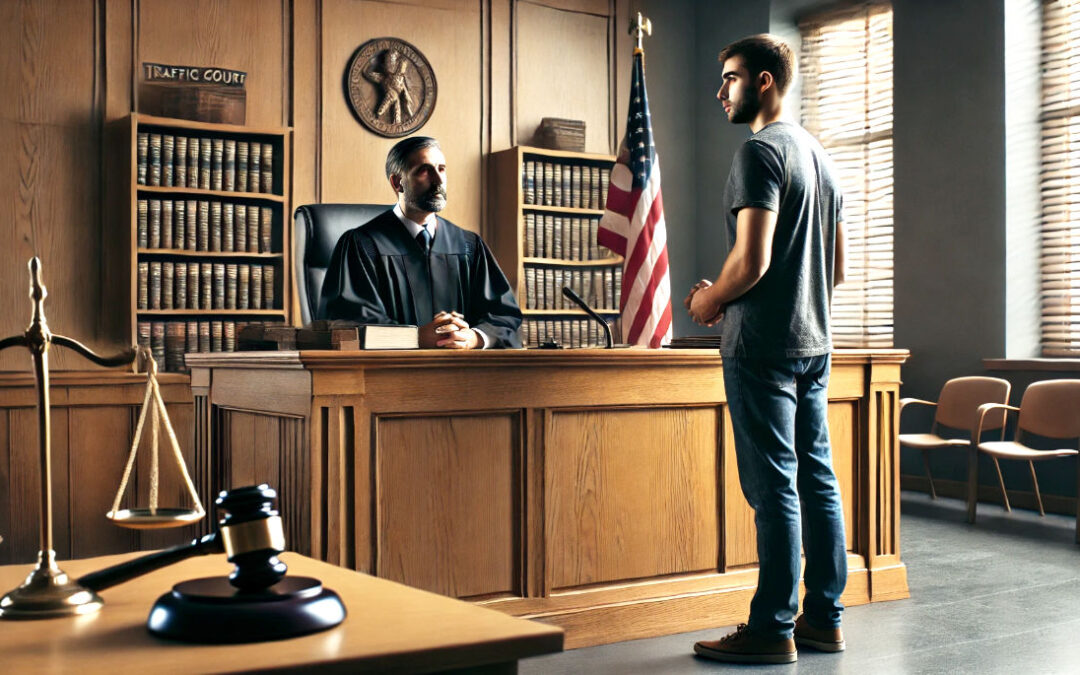In North Carolina, the criminal courts sometimes use a device known as “Prayer for Judgment Continued” or “PJC” to dispose of certain cases. PJC is unique to North Carolina, and can be helpful in avoiding license and insurance points in traffic cases. PJC is subject to limitations however, and won’t always work.
That’s why many attorneys, including our office, usually opt to use it as a last resort.
How prayer of judgement works:
After you enter a plea of “guilty” or “responsible” in a North Carolina traffic case, the presiding judge will “pronounce judgment” and then move to sentencing. At this stage, the judge has options:
- He or she may execute judgment immediately
- Announce judgment and then suspend it for some period of time
- Continue prayer for judgment.
In most cases, the judge will immediately execute his or her sentence by ordering you to pay a fine, do some community work, or even spend time in jail if the conviction is severe enough. This is the most common outcome in a traffic case like simple speeding.
Other times, you may hear the judge render a sentence (like “30 days in jail”) and then suspend it for some period of time, during which the defendant needs to meet certain conditions.
Finally, from time to time you’ll hear the judge render a sentence and then grant a “Prayer For Judgment Continued” instead of taking any further action. This can mean different things, depending on the type of case.
For traffic infractions, it usually means no further disposition is anticipated. As such, lawyers, defendants and insurance companies often view PJC as a “one free pass” – though that isn’t exactly the case.
PJC’s have limitations. For instance, it isn’t available at all for certain offenses like drunk driving, or speeding more than 25 mph over the limit. It also can’t be used more than twice in a five year period. If you do get a third PJC in five years, the court system will chalk it up as a conviction and it won’t stop the North Carolina DMV from assessing points or revoking your license.
For insurance purposes, you only get one PJC every three years per household. In other words, if someone else on your household’s insurance policy has already used a PJC in the past three years, then it won’t help you avoid the insurance ramifications of your ticket.
Because of these limitations, PJC is often considered a last resort.
Examples of when to seek a PJC:
We normally advise our clients to avail themselves of a PJC in limited situations – usually when their license is in jeopardy or when it can avoid a major insurance hit.
Your license is in jeopardy…
North Carolina has a license point system that generally allows you to accumulate up to 12 points in a three year period. Once you hit 12 points in three years, your license will be suspended. If you’ve lost your license and had it reinstated, then the limit drops down to 8 points in three years.
If you are up against the 12 or 8 point limit, then a PJC might help you keep your license. North Carolina DMV will honor two PJC’s in a five year period and refrain from issuing points or enacting a revocation. So, while a PJC won’t necessarily help with your insurance (see below), it may nevertheless help you to keep driving.
Avoiding an insurance hit…
The insurance industry is stingier about recognizing your PJC than the North Carolina DMV. They’ll give you one every three years – per household. But, if it is available, a PJC can help save you lots of money in insurance premiums.
Often, if you have a good driving record, and your charge isn’t too severe, then we recommend keeping the PJC in your pocket in case you need it later. For instance, you should never plead guilty to speeding and ask for a PJC if a reduction to Improper Equipment or 9 over the speed limit will work.
Other times…
Of course the two above situations aren’t the only times a PJC can or should be used. It all depends on the client’s particular circumstances. There are times when a driver with a good, clean record may want to avail him or herself of a PJC to avoid the ramifications of a rare ticket that would otherwise cause a big problem. On one recent occasion, we had a client with a good record who was forced to plead guilty to reckless driving. This would have had a severe impact on his license and insurance… but the judge was willing to grant prayer for judgment because the conviction seemed like a “blip” on his other good driving history.
Other considerations…
While it may help you avoid license and insurance points, a PJC still shows up as a conviction on your record. Therefore, it may not be so helpful for someone with commercial driver’s license who needs to maintain a clean record to keep their job.
Also… it is important to understand that whether or not to grant a PJC is in the discretion of the judge. It’s not uncommon to ask for a PJC and have your request denied. With that said, having a strategy to ask for a PJC carries inherent risk. Usually, it’s a good idea to let the district attorney know you are asking for a PJC and seeing if they’ll consent.
Finally, we know the North Carolina DMV will accept your PJC when it is applicable. Other states may not. Therefore, if you are an out of state driver, it is very risky to seek and receive a PJC in North Carolina and expect it to be accepted in the state where you are licensed. Generally, out-of-state drivers are recommended to seek other resolutions to their ticket and use PJC only if nothing else will work.
Call us at 336-995-0060 or email at info@mcelweelawfirm.com.

Will McElwee has been a traffic attorney for over 25 years, and has established a solid track record helping folks from Boone and Wilkesboro to Winston Salem address traffic tickets. His family has a long and fruitful history in the area: the McElwee Law Firm began in 1932. Will’s grandfather, William H. McElwee, Jr., was a former president of the North Carolina Bar and sat on North Carolina’s Board of Law Examiners for many years.
As a “Double Deac,” Will attended Wake Forest University for both undergraduate and law school. He is a certified Superior Court and Family Financial Mediator and is also certified in the field of collaborative law.


